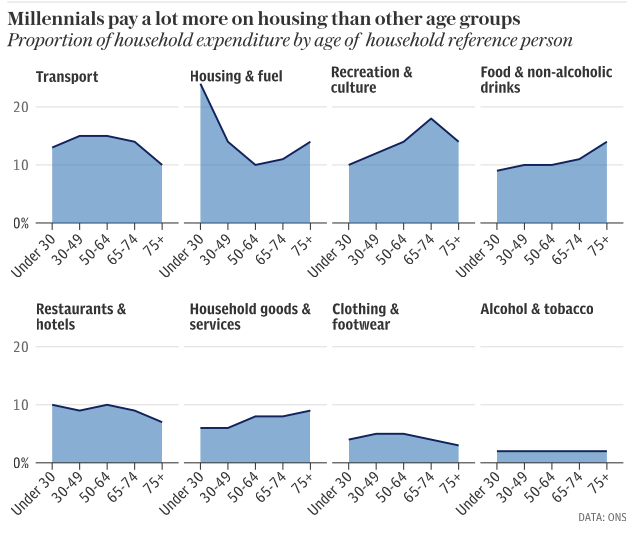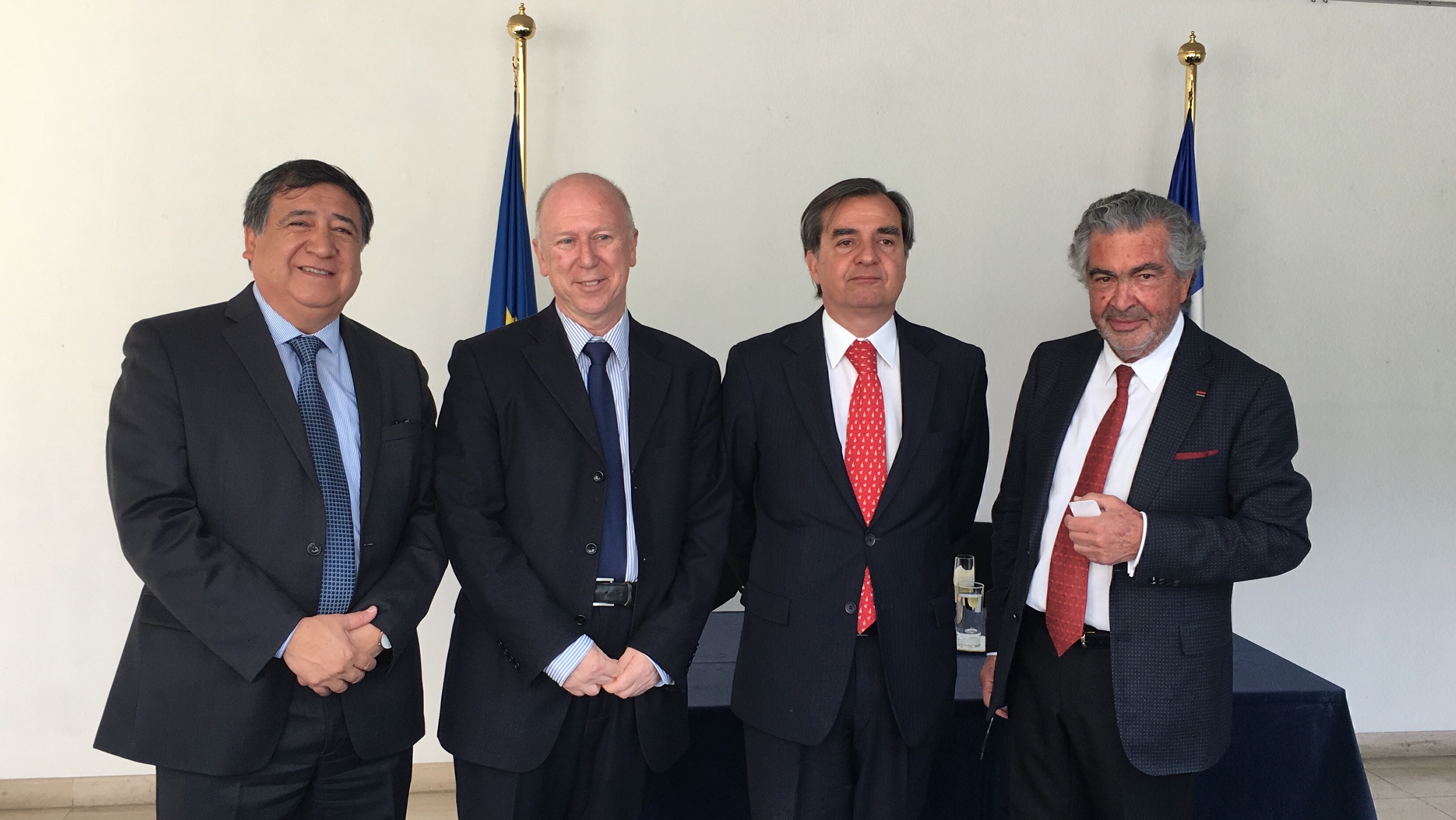I rarely blog about matters unconnected with EARSC and the EO sector but this one is an exception based on personal views.
I came across this chart recently. It comes from a report looking at intergenerational wealth produced by the UK Resolution Foundation which is chaired by David Willets - former Research Minister who was largely responsible for initiating the strong space investment in the UK (but this is the only connection with the space sector).
The chart shows the household expenditure across the generations. What stands out is the very large difference for the proportion of income spent on housing. Indeed, whereas for my generation (the baby boomers) at age 30 around 40% of us owned our own house, today (for the millennials) it is less than 20%. Overall home ownership has dropped from 72.5% to 63.4% over the last 10 years (source tradingeconomics.com). Other statistics show that, for the generation under 30 today by the time they are 40, they will spend 64 hours more per year in commuting than we did at the same age. That is nearly 2 working weeks just travelling to and from work and less time spent with their families. |
The report concludes that facing significant deficits in health spending in the UK the traditional approach of asking the next generation to pay for the former just cannot work. Already, the millennials are less able to buy into home ownership, cannot afford to set aside enough for their own old-age and yet are facing the prospect of higher taxes to pay for my generation. This cannot work. The UK is not alone in this situation, it is faced by most developed countries to a greater or lesser degree.
I grew-up in a golden age without i-phones, computer games, cheap flights to weekend destinations and many other consumer goods, but whilst making life more agreeable they are not basic needs according to Maslow’s pyramid. We had home ownership, final benefit pension schemes and a free at source health-care system – and scientific progress means that we live much longer. My generation decided upon a social model which is not sustainable and which is leading to greater inequality between the have’s and have not’s.
It will be unpopular amongst the older generations and especially pensioners, but somehow and by some means we shall be forced to pay for this Ponzi scheme of expectations stemming from, us, the baby boomers.
I add just one further observation, that it is the pace of change which is causing the majority of problems. Given time we can adapt. Some individuals adapt faster than others (and can benefit from the confusion if their judgements are accurate), but as a whole, society needs time to accept change. If I look at the UK at the moment, the “ruling class” as represented by the current government are completely out of touch with the real situation facing the country. The lunatics are in control of the mad-house and Brexit is headed straight for the rocks. Where are the leaders who can get to grips with the coming crisis hoping that they are not like those in the Handmaid’s Tale[1].
[1] The Handmaids Tale is a book by Margaret Attwood, recently realised as a TV series currently entering its second season. It describes a dysfunctional future where women are objects and the ruling class are religious fanatics. All freedoms are lost except for the hypocritic ruling class.
Last Friday, on behalf of EARSC, I signed a Memorandum of Understanding between EARSC and EuroChile Business Foundation. Mr. Vicente Caruz, President of Eurochile signed on their behalf and we are delighted to extend our international co-operation to Chile.
EuroChile is a venture set up by the EU and the government of Chile to promote business co-operation. Through the MoU we expect to be able to offer opportunities for business and technology transfer. Chile is considered as an important partner and is one of our priority countries within the IDEEO project. This has been re-enforced by the signature by the EC regarding access to Copernicus products and services.
We have so far been able to support activities in Chile on 2 occasions. Firstly, last year when we accompanied the EC together with a number of EARSC members to a 2 day workshop on Copernicus. Then secondly, earlier this year when we participated to the meetings organised around FIDAE 2018. Next steps will be to organise a focused workshop in Chile and to examine possibilities for an inward mission of Chilean companies to Europe.
EuroChile is also a Copernicus Relay and we shall support them in that venture with expertise and networking to try to maximise the impact which Copernicus can have on government services.
Many thanks to the Chilean Embassy in Brussels and His Excellency Raul Fernandez Daza for hosting this ceremony. We were really pleased to be with you and really look forward to increasing links between companies in Europe and Chile. A big thank you as well to the other actors from Chile, from DG Environment and the EU External Action Service for coming along and to making it such an enjoyable occasion.
Jose Aravena, Geoff Sawyer, Viente Caruz, His Excellency Raul Fernandez Daza.
The EC has published its proposed budgets for the next Multi-Annual Financial Framework Perspective 2021 to 2028 which includes an allocation for “space” of €16b. This will provide continuity for the 2 EC flagships; Galileo and Copernicus.
The main interest from the EO services sector is towards the Copernicus programme and it is great to see that this is assured. Copernicus has become the world’s leading satellite Earth Observation programme and is playing a strong role to help develop the EO services sector in Europe. The EC is currently consulting on the shape of the Copernicus programme in the next MFF and EARSC will provide a formal response to this question following a consultation with the industry in late June.
Continuity of data supply and the confidence that this will be maintained in the future is fundamental for businesses to develop. Whilst the return upstream is strategic the economic value is generated downstream where the return on investment is high. EARSC welcomes the strong commitment being shown by the EC and calls upon the European Parliament and EU Council to endorse this budget proposal ensuring that a sufficient part is earmarked and dedicated to the development of Copernicus.
Owning and operating space assets is a necessary pre-requisite but has little value to the public if the data is not exploited. With the overall goal to serve public-sector and government needs this should be assured through the services which Copernicus can deliver. Since the 2014 Copernicus Regulation, a cornerstone of the programme has been to leverage the investment to help develop the downstream sector. Hence, we also call upon the decision makers to ensure an adequate portion of around 25% of the programme budget is dedicated to the services, to user uptake and to the development and exploitation of the data being generated.


